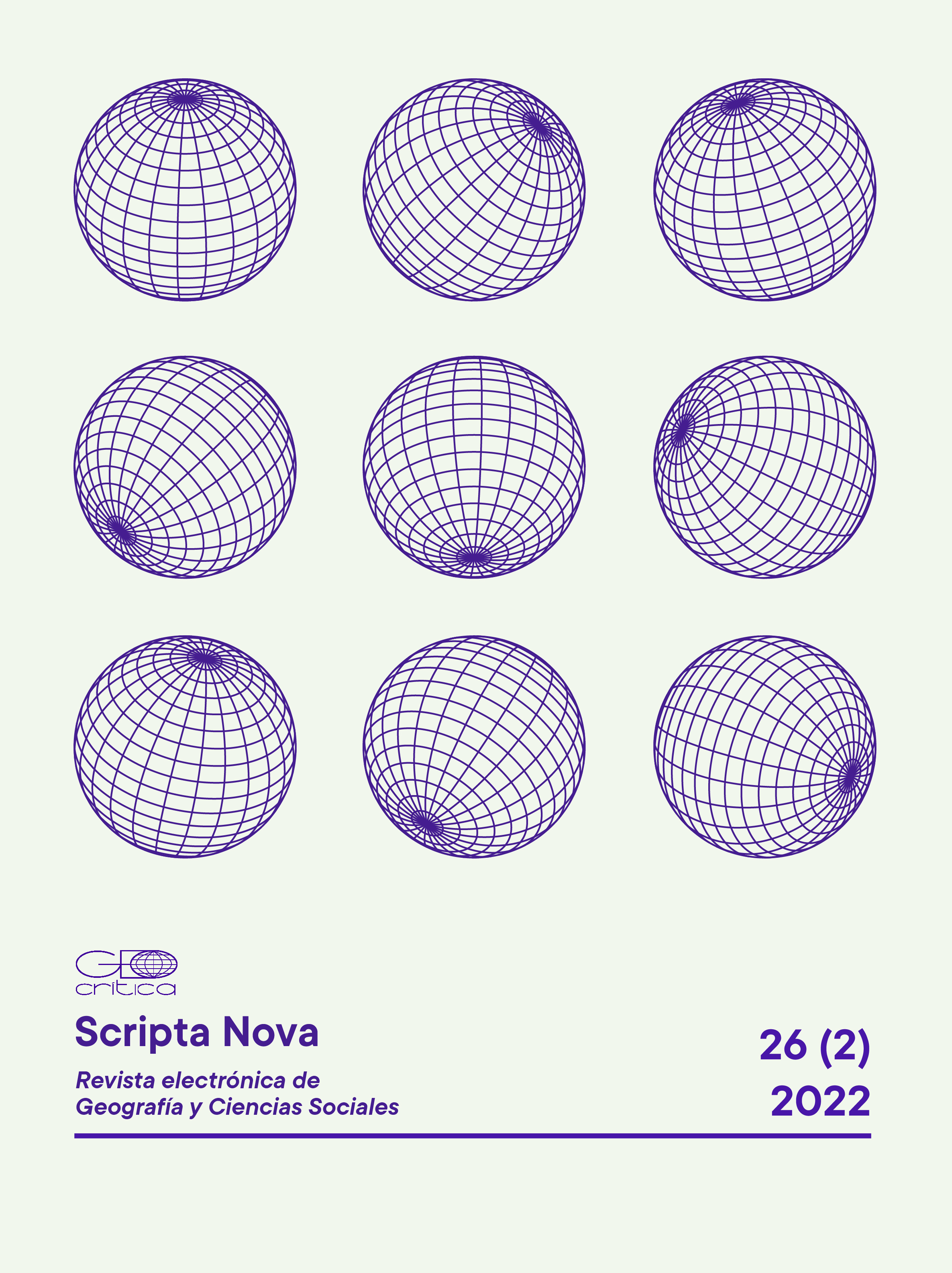Paper infrastructures: new instruments of financialization of space
DOI:
https://doi.org/10.1344/sn2022.26.35245Keywords:
neoliberalismo, financiarización, infraestructura, obligaciones, financiación estatalAbstract
On the threshold of the new century, with the intensification of financial dominance over the capitalist system and an expansion of the search for new spaces of accumulation, we witness the resumption of the international debate on the pattern of financing infrastructure. This article explores a set of empirical data on new mechanisms for private financing of infrastructure in Brazil, with an emphasis on the post-2011 period, due to the more expressive dissemination of new products, such as the infrastructure debentures. The first objective is to explore the process of building the hegemonic narrative of neoliberalization of the State for the provision of infrastructure, rooted in a binary vision between the public and the private. The second objective is related to the results of our empirical research, from which we discussed the really existing neoliberalism, which points to an emerging financing pattern marked by hybridism between the public and private spheres.
References
Abreu, Marlon. A. Melazzo, Everaldo. S. e Ferreira, João. V. S. 2020. “Produzindo casas de papel: As engrenagens da securitização de ativos imobiliários residenciais no Brasil”. Confins. Paris [Online], 47. 1-16. https://doi.org/10.4000/confins.33013
Andreucci, Diego, Lamarca, Melissa. G., Wedekind; Jonah E. e Swyngedouw, Erik. 2017. “Value Grabbing”: A Political Ecology of Rent. Capitalism Nature Socialism, 28 (3), 28-47. https://doi.org/10.1080/10455752.2016.1278027
Belluzzo, Luiz, G. Almeida, Júlio G. 2002. Depois da queda: a economia brasileira da crise da dívida aos impasses do Real. Rio de Janeiro: Civilização Brasileira.
Blyth, Mark. 2013. Austerity: the history of a dangerous idea. USA: Oxford University Press.
Boito Jr., Armando e Berringer, Tatiane. 2013. “Classes sociais, neodesenvolvimentismo e política externa nos governos Lula e Dilma”. In: Dossiês: Revista de Sociologia e Política, 2 (47), 31-38. https://doi.org/10.1590/S0104-44782013000300004
Botelho, Adriano. 2007. A cidade como negócio: produção do espaço e acumulação do capital no município de São Paulo. Cadernos Metrópole, 18:15-38.
Braga, José. C. 1997. “Financeirização global. O padrão sistêmico de riqueza do capitalismo contemporâneo”. Poder e dinheiro. Uma economia política da globalização, editado por Tavaes, M. da C. e Fiori, J. L. 195 – 242. Petrópolis: Vozes.
Brasil. 2011. Lei nº 12.431, de 24 de Junho de 2011. Dispõe sobre a incidência do imposto sobre a renda nas operações que especifica. http://www.planalto.gov.br/ccivil_03/_ato2011-2014/2011/lei/l12431.htm.
Brasil. 2020. Boletim Informativo de Debêntures Incentivadas. Ministério da Economia. Dezembro, 85. https://www.gov.br/economia/pt-br/centrais-de-conteudo/publicacoes/boletins/boletim-de-debentures-incentivadas/2020/spe-me-boletim-debentures-lei-12-431-dez-2020.pdf/view
Brenner, Neil. 2004. New State Spaces: Urban Governance and the Rescaling of Statehood. Oxford: Oxford University Press.
Carcanholo, Reinaldo, A. e Sabadini, Mauricio. 2009. “Capital Fictício e Lucros Fictícios”. Revista Soc. Bras. Economia Política, 24, 41-65.
Carvalho, André. 2013. Infraestrutura sob uma perspectiva pública: instrumentos para o seu desenvolvimento. PhD thesis, Universidade de São Paulo.
Furtado, Celso. 1961. Desenvolvimento e subdesenvolvimento. Rio de Janeiro: Fundo de Cultura.
Graham, Steve e Marvin, Simon. 2001. Splintering Urbanism: networked infrastructures, technological mobilities and the urban condition. New York: Routledge.
Harvey, David. 2013. Os limites do capital. São Paulo: Boitempo.
Dardot, Pierre e Laval, Christian. 2016. A nova razão do mundo: ensaio sobre a sociedade neoliberal. São Paulo: Editora Boitempo,
Lorrain, Dominique. 2011. “La main discrète”. Revue française de science politique, 6 (61), 1097-1122. DOI 10.3917/rfsp.616.1097
Marx, Karl. 2013 [1979]. O capital: crítica da economia política. São Paulo: Editora Boitempo.
Morettini, Felipe T. R. 2019. “Financiamento de Longo Prazo e Desenvolvimento: Uma Análise da Regulação das Debêntures de Infraestrutura no Financiamento Nacional entre os anos de 2011 e 2016”. PhD thesis, Universidade de Campinas.
Oliveira, Francisco de. 1998. “Surgimento do Anti-valor, Capital, força de trabalho e fundo público”. CEBRAP, São Paulo. 22, 8-28.
Oliveira, Paula. 2019. Os Entraves Institucionais para uma maior participação do setor privado no financiamento da infraestrutura: o caso das debêntures incentivadas. PhD thesis, Instituto de Pesquisa Econômica Aplicada.
O’NeilL, P. The financialisation of urban infrastructure: a framework of analysis. Urban Studies, 2018.
Paulani, Leda. 2013. “Acumulação sistêmica, poupança externa e rentismo: observações sobre o caso brasileiro”. Estudos Avançados. 27 (77), 237-261. https://doi.org/10.1590/S0103-40142013000100018
Paulani, Leda. 2016. “Acumulação e rentismo: resgatando a teoria da renda de Marx para pensar o capitalismo contemporâneo”. Revista de Economia Política (online), v. 36: 514-535. https://doi.org/10.1590/0101-31572016v36n03a04
Royer, Luciana. 2016. “O FGTS e o mercado de títulos de base imobiliária: relações e tendências”. Cadernos Metrópole, 18 (35), 33-52. https://doi.org/10.1590/2236-9996.2016-3502
Singer, P. 2018. O Lulismo em Crise: um quebra-cabeça do período Dilma (2011-2016). São Paulo: Companhia das Letras.
Sunkel, Osvaldo. 1998. “Desarrollo, subdesarrollo, dependencia, marginacion y desigualdades espaciales; hacia un enfoque totalizante”. Investigación Económica. 31 (121) 23–77.
UQBAR. 2020. 12º Anuário Certificado de Recebíveis Imobiliário. São Paulo.
Downloads
Published
Issue
Section
License
Copyright (c) 2022 Laisa Marostica Stroher, Marlon Altavini de Abreu, Alexandre Yassu, Jeroen Klink, Luis Cunha

This work is licensed under a Creative Commons Attribution 4.0 International License.
Los autores que publican en esta revista están de acuerdo con los siguientes términos:
- Los autores conservan los derechos de autoría y otorgan a la revista el derecho de primera publicación, cin la obra disponible simultáneamente bajo una Licéncia de Atribución Compartir igual de Creative Commons que permite compartir la obra con terceros, siempre que estos reconozcan la autoría y la publicación inicial en esta revista.
- Los autores son libres de realizar acuerdos contractuales adicionales independientes para la distribución no exclusiva de la versió de la obra publicada en la revista (com por ejemplo la publicación en un repositorio institucional o en un libro), siempre que se reconozca la publicación inicial en esta revista.





